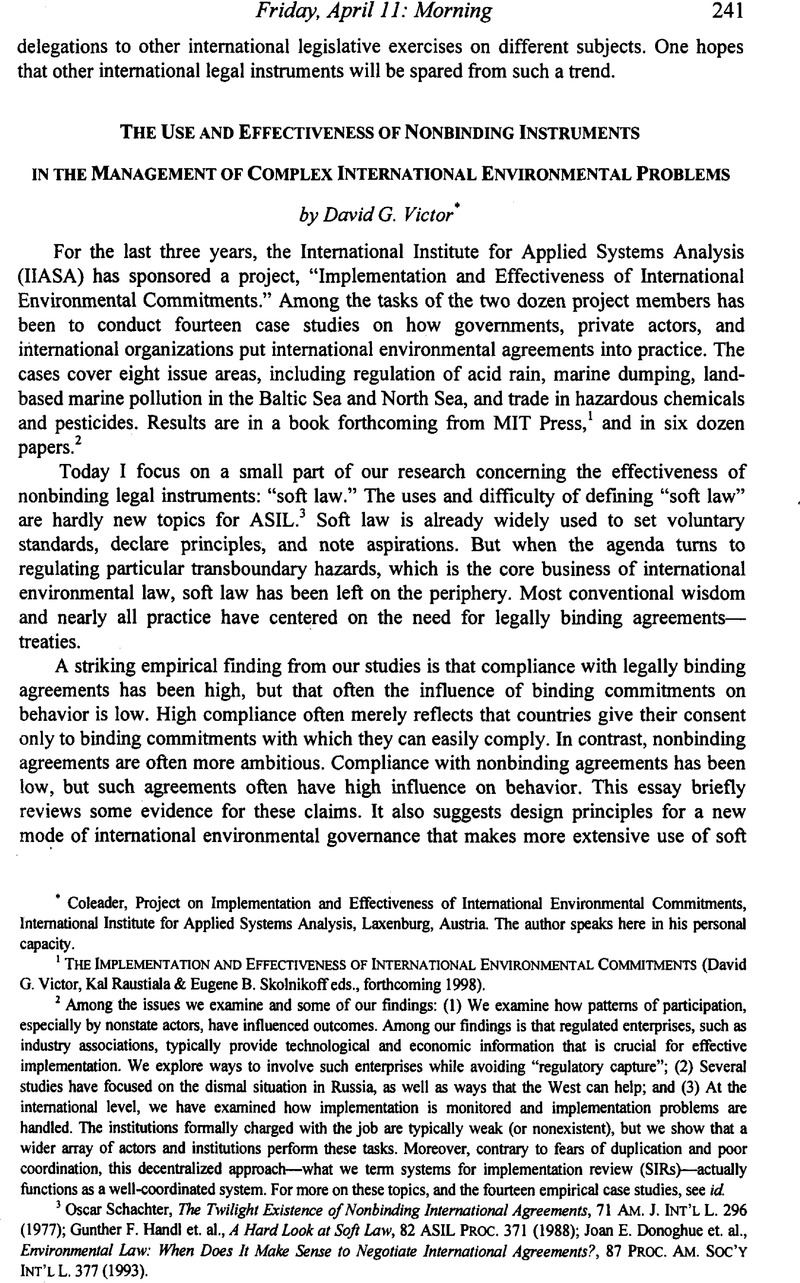Article contents
The Use and Effectiveness of Nonbinding Instruments in the Management of Complex International Environmental Problems
Published online by Cambridge University Press: 28 February 2017
Abstract

- Type
- Compliance with International Environmental Treaties: The Empirical Evidence
- Information
- Copyright
- Copyright © American Society of International Law 1997
References
1 United Nations Framework Convention on Climate Change, May 9, 1992, 31 I.L.M. 848 (1992) (entered into force Mar. 21, 1994) [hereinafter Climate Change Convention].
2 The Intergovernmental Negotiating Committee, a subsidiary body established by the General Assembly to negotiate a convention on climate change, established two working groups: Working Group 1 (commitments) and Working Group 2 (legal and institutional issues).
3 See Jacob Werksman, Designing a Compliance System for the Climate Change Convention, Oct. 27, 1995 (Foundation for International Environmental Law and Development working paper, SOAS, University of London, UK).
4 During the climate change negotiations that led (1991-1992) to the adoption of the text of the convention, the present “WTO Understanding on Rules and Procedures Governing the Settlement of Disputes” had not yet been established. The DSU strengthens the former GATT dispute settlement procedures and provides for establishing panels, at the request of Members, to resolve disputes between members. These panels make recommendations in their panel reports to the Dispute Settlement Body (DSB) with regard to the course of action to be followed by a Member in order to resolve a specific dispute. The DSB decides whether these recommendations should be implemented. A recommendation may be for the removal of the offending measure by a Member. The DSB, in extreme cases, may administer sanctions (compensation, suspension of concessions, retaliation).
5 Climate Change Convention, supra note 1, art. 13.
6 See Xueman Wang, Towards a System of Compliance: Designing a Mechanism for the Climate Change Convention, Dec. 1996 (Max Planck Institute for Comparative Public and International Law).
7 Edith Brown Weiss & Harold J. Jacobson, Why Do States Comply with International Agreements?, Human Dimensions 1 (1996), cited in Wang, supra note 6, at 1.
8 The Conference of the Parties, at its first session, held in Berlin in 1995, adopted the “Berlin Mandate, ” in which parties agreed to establish the Ad Hoc Working Group on the Berlin Mandate (AGBM), with the aim of adopting a “protocol or another legal instrument” at the next session of the Conference of the Parties (COP 3), scheduled for Fall 1997 in Kyoto, Japan.
9 See Werksman, supra note 3, at 11-17.
10 See Syntheses of responses to questionnaire on the establishment of a multilateral consultative process under Article 13, U.N. Doc. FCCC/AG13/1996/1.
11 These quotes are the result of private correspondence. See generally David Victor, Design Options for Article 13 of the Framework Convention on Climate Change: Lessons from the GATT Dispute Panel System, Nov. 1995 (International Institute for Applied Systems Analysis, ER 95-1, Laxenburg, Austria).
12 Articles 15 and 16 provide that amendment of the convention and the adoption and amendment of annexes to the convention shall require consensus and, as a last resort, a three-fourths majority vote of the parties present and voting.
13 See Decisions taken at the first session of the COP, Berlin, Germany, Mar. 28-Apr. 7 1995, U.N. Doc. FCCC/CP/1995/7.
14 However, parties to the protocol must be parties to the convention.
- 5
- Cited by


